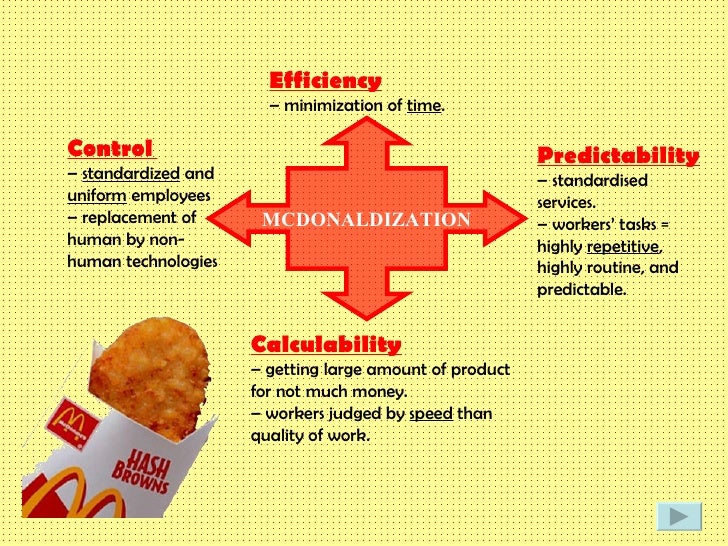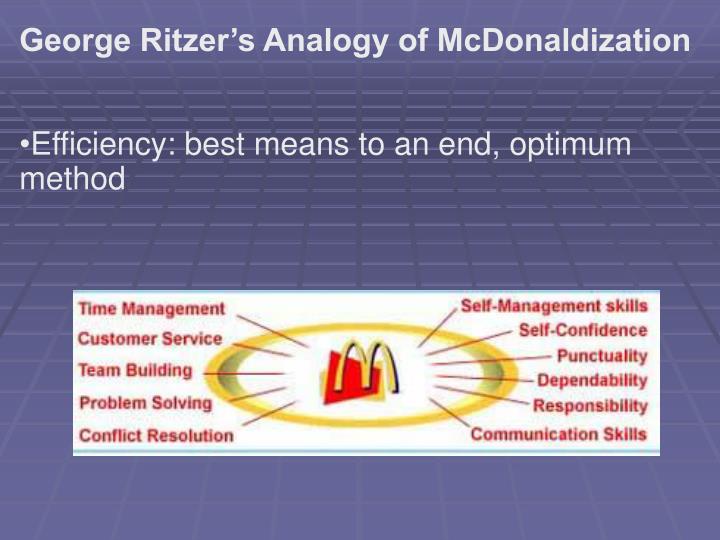Have you ever noticed how the same burger tastes almost identical, no matter which McDonald’s you visit, across the globe? This astonishingly consistent experience is a testament to the concept of “Mcdonaldalization,” a term coined by sociologist George Ritzer. It encapsulates the increasing prevalence of fast-food principles, not just in the restaurant industry but across a vast spectrum of modern life, impacting everything from education to healthcare.

Image: www.slideshare.net
This article delves into the heart of Mcdonaldalization, unpacking the four defining principles of efficiency, calculability, predictability, and control. We’ll explore the advantages and disadvantages this phenomenon has brought to our world, and consider its implications for the future.
The Four Pillars of Mcdonaldalization: Efficiency, Calculability, Predictability, and Control
Mcdonaldalization revolves around four core principles that aim to streamline and optimize processes. These principles work in synergy to create a highly efficient and predictable system.
1. Efficiency: The Quest for Speed and Simplicity
Imagine stepping into a McDonald’s. The process is designed to move you through quickly, from ordering to receiving your food. Tasks are broken down into simple steps, and workers are trained to execute these steps with precision, maximizing output. This pursuit of efficiency is a driving force behind Mcdonaldalization, extending far beyond the fast-food realm.
From online shopping to automated customer service, we’re constantly exposed to systems that prioritize speed and simplicity. While efficiency can undoubtedly boost productivity, it sometimes comes at the cost of personalized service and the human element.
2. Calculability: Quantifying Quality and Value
Have you ever noticed how McDonald’s prices are often displayed prominently, or how they emphasize the number of items in a meal? This emphasis on quantity over quality is a key aspect of calculability. Mcdonaldalization values measurable metrics, using them to assess success and drive decision-making.
Calculability has infiltrated various aspects of our lives, from standardized testing in education to performance evaluations in the workplace. While quantifiable metrics offer a way to gauge progress, they can sometimes lead to a focus on narrow measures at the expense of broader, qualitative aspects.

Image: www.slideserve.com
3. Predictability: Reassuring Familiarity and Consistent Experience
Every time you walk into a McDonald’s, you know what to expect: the same menu, the same decor, the same friendly (or perhaps robotic) service. This predictability is comforting, as it eliminates uncertainty and provides a sense of familiarity.
Mcdonaldalization spreads this principle across various industries. From chain stores with consistent branding to the uniform layout of many hospitals, we’re surrounded by environments designed for predictability and ease of navigation. While this can reduce stress and increase efficiency, it can also lead to a sense of monotony and a lack of individuality.
4. Control: Substituting Human Agency for Technology
McDonald’s utilizes automation to control production processes. From self-service kiosks to automated grills, technology is increasingly replacing human labor, standardizing outputs and minimizing potential variability.
This principle of control is evident in various industries, from self-checkout kiosks in grocery stores to automated customer service systems. While technology can improve efficiency and reduce error, it can also lead to a loss of personal interaction and human connection.
The Benefits and Drawbacks of Mcdonaldalization: A Balancing Act
Mcdonaldalization has brought undeniable benefits to our world. Its principles have led to increased efficiency, lower prices, and greater accessibility to a wide range of products and services. The fast food industry, for instance, has revolutionized how we eat, making meals more convenient and affordable.
However, Mcdonaldalization is not without its downsides. The focus on efficiency can lead to dehumanization, as tasks become repetitive and workers are treated as cogs in a machine. The obsession with calculability can narrow our focus, neglecting crucial qualitative aspects of our experiences. And while predictability provides comfort, it can also stifle creativity and diversity.
Navigating the Mcdonaldalized World: Embracing Balance and Human Connection
Mcdonaldalization is an undeniable force shaping our world. It’s a double-edged sword: a powerful tool for achieving efficiency and accessibility, but with the potential to sacrifice human connection and individuality.
To navigate this world, we must cultivate a balanced approach, recognizing the benefits while staying alert to its potential drawbacks. We can strive to create systems that are efficient without sacrificing human connection, where predictability doesn’t stifle creativity, and where calculability doesn’t overshadow intangible values.
Ultimately, our ability to harness the power of Mcdonaldalization while preserving the human spirit lies in our willingness to be mindful consumers, demanding a balance between efficiency and human connection in all aspects of our lives. We must foster a society where technology enhances our lives without replacing the intrinsic value of personal interactions, individuality, and a sense of community.
Efficiency In Mcdonaldization
Call to Action:
How has Mcdonaldalization impacted your life? Have you noticed its effects in your workplace, your local grocery store, or your interactions with online services? Share your thoughts and experiences in the comments below! Let’s explore this complex phenomenon together and work towards a future where Mcdonaldalization serves as a tool for progress, not a force that dehumanizes and homogenizes our world.






